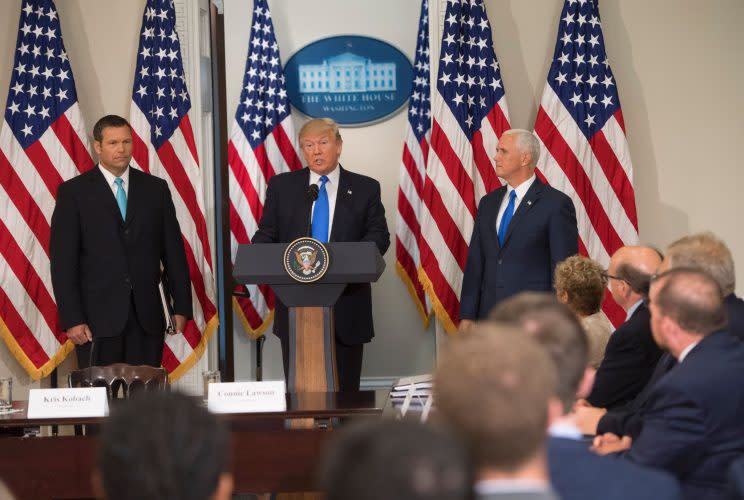Trump accuses states of hiding ‘something’ as voter fraud panel convenes
As the White House’s controversial voter fraud panel gathered for its first meeting, President Trump accused states that didn’t turn over data of hiding something.
“I’m pleased that more than 30 states have agreed to share their information with the commission, and the other states [where] that information will be forthcoming,” said Trump. “If any state does not want to share this information, one has to wonder what they’re worried about. I ask the vice president and I ask the commission: What are they worried about? There’s something — there always is.”
The comments echoed a Trump tweet from earlier this month: “Numerous states are refusing to give information to the very distinguished VOTER FRAUD PANEL. What are they trying to hide?”
The Presidential Advisory Commission on Election Integrity was created by Trump after he was asked to back up his claim that millions of illegal votes were cast in 2016, which followed months of warnings that the election would be rigged against him. On the impossible-to-prove assumption that the illegal votes were all cast for his opponent, he claimed to have won the popular vote, which he actually lost by nearly three million ballots.
Although White House officials have repeated these claims frequently, they have offered no evidence, and almost no verifiable cases have been cited in the media or by election officials in the states. Multiple studies have found little evidence of fraud, with a large study in 2014 finding 31 instances of credible fraud out of one billion votes cast.

Trump’s accusations were odd because Kansas — where the panel’s vice-chair, Kris Kobach, is the secretary of state — was one of the states unable to turn over all the information requested due to state laws. Kobach had previously said that it was “perfectly fine” for states to withhold information, but critics of the program said the commission made requests that it knew could not be fulfilled so its officials could then accuse the states of hiding something. The insinuation that states where officials refused to comply were hiding something was also made during an interview with Kobach on Fox News Wednesday morning.
The backlash to the panel has been widespread and bipartisan. Republican secretaries of state joined Democratic colleagues in denying the White House information that wasn’t available publicly, with others pointing out that it’s odd for a bipartisan commission to have both the chair, Vice President Mike Pence, and co-chair, Kobach, from the same party. Kobach also has said the commission would not release voters’ personal information, but the commission published the home addresses, phone numbers and email addresses of some people who emailed comments to its website.
Kobach, who has been called “the king of voter suppression” by the ACLU, lost a lawsuit last year and was forced to restore the registrations his office had stripped from nearly 20,000 Kansans. The commission’s request for information has already caused voting rolls to be reduced, with 3,700 Coloradoans withdrawing their registrations after the state said it would hand over voter data.
One issue not mentioned by Trump Wednesday was the report from U.S. intelligence officials that Russia targeted 21 states during the 2016 election. This comes in conjunction with the news that Secretary of State Rex Tillerson is considering closing the cybersecurity office at the State Department.
Appearing on CNN shortly after Trump spoke, Kentucky Secretary of State Alison Lundergran Grimes, a Democrat, blasted the need for the panel.
“We have the president admitting the baseless claims for which this sham commission was put together are his insecurity for losing the popular vote,” Grimes said. “What we don’t have and what we still don’t have answers to is why this commission continues to waste taxpayer dollars on a claim expert after expert and even elected official after elected official continue to say doesn’t exist — and that is three to five million folks voted illegally in this last election.”
Matthew Dunlap, Maine’s Democratic secretary of state, attempted to find common ground in the opening remarks of the panel.
“I listened very closely to the remarks of the president, but no one who’s spoken — including the president — has questioned the legitimacy of the 2016 election, and I think that’s a great place to start from,” said Dunlap.
In fact, Trump has repeatedly questioned the legitimacy of the 2016 election. What he hasn’t questioned is its outcome.
Read more from Yahoo News:
As McConnell plan fails, will Democrats and Republicans work together to fix health care?
Over 20 members of Congress ask the FBI to review Ivanka Trump’s security clearance
Kamala Harris: The Democratic message is ‘telling the American public we see them’
Coulter won’t back down, sit down or pipe down on Delta seat mishap


